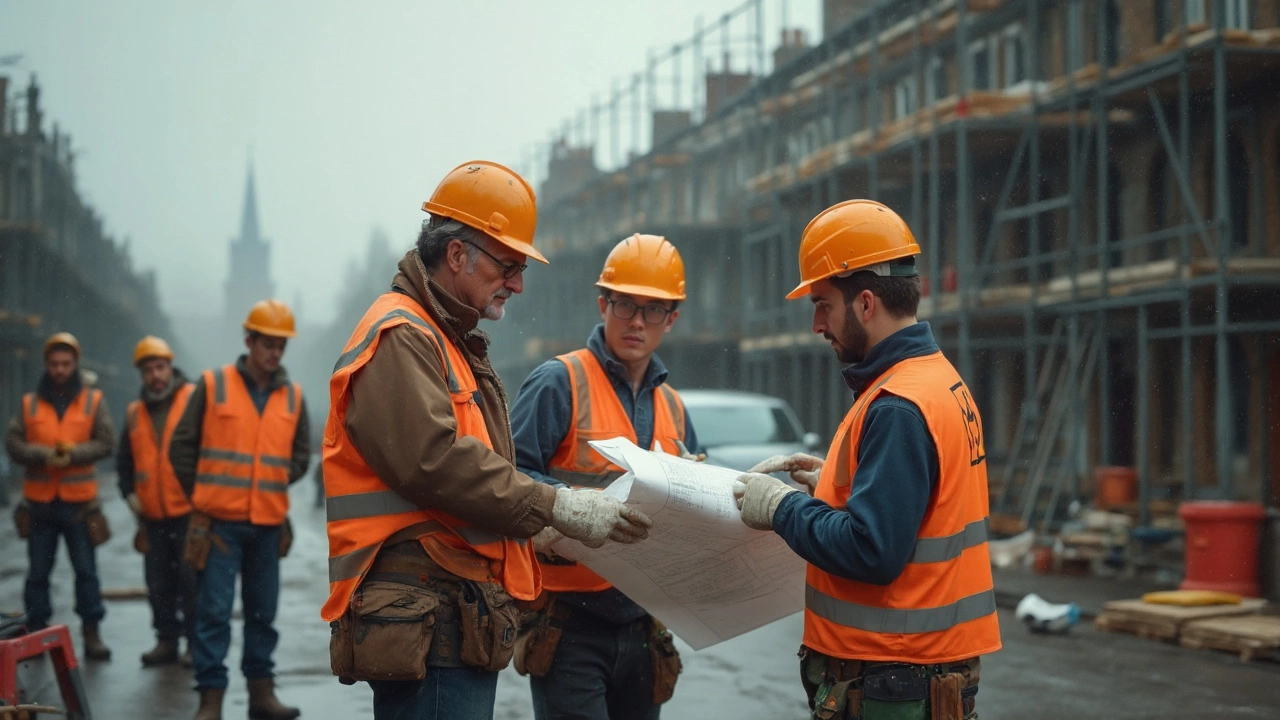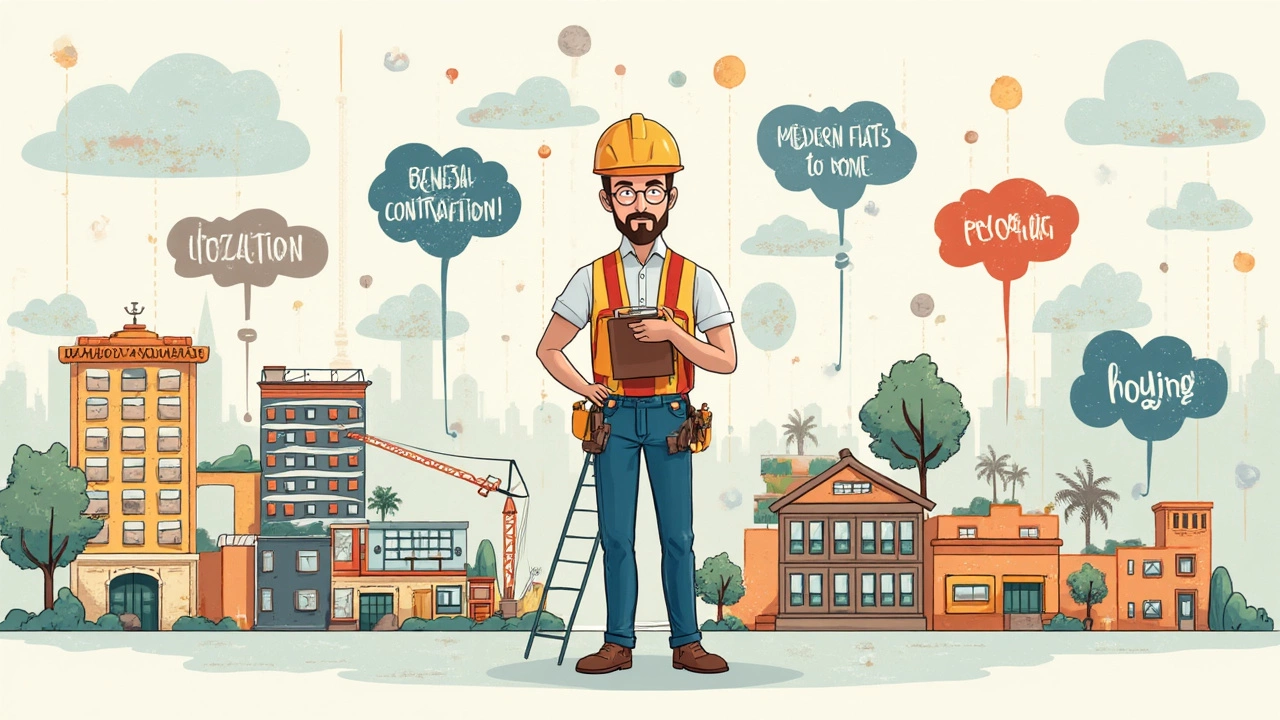Building Contractor Meaning: What Do They Really Do?
 May, 1 2025
May, 1 2025
Ever looked at a construction site and wondered who's really running the show behind all the hammering and shouting? That’s the building contractor, and no, their job is not just about bossing people around with a coffee in hand. They’re the ones making sure your dream house doesn’t end up as an endless money pit or a patchwork of wonky walls.
When you hear "building contractor," think project boss—they’re hired by property owners to actually get buildings built. They line up the crew, handle permits, schedule deliveries, and keep things running (mostly) on time and budget. Without a reliable contractor, even the best-designed plan can go sideways fast, especially if you’re juggling plumbers, electricians, and city inspectors all at once.
What makes this gig tricky isn’t just the paperwork. One misstep—like hiring the cheapest bid from someone with no license—and you could land in months of delays or worse, shoddy work that’ll cost double to fix. Stick around for some sharp tips on spotting red flags, hiring pros, and navigating the real-world contractor jungle.
- The Role of a Building Contractor
- How Contractors Manage Construction Projects
- Common Misconceptions and Costly Mistakes
- Tips for Hiring the Right Contractor
The Role of a Building Contractor
A building contractor is basically the linchpin of any construction project. Think of them as the organizer, problem-solver, and gatekeeper all rolled into one. They handle everything from the very start—lining up the right subcontractors—right down to the last paint touch-up. A good contractor keeps the chaos in check so you don’t end up in a money pit disaster.
What sets a building contractor apart isn’t just the ability to hire a construction crew. Their main job is to translate your vision (and architect’s plans) into an actual finished space. This means:
- Getting permits and making sure the project meets local codes
- Managing the timeline and keeping the job on schedule
- Choosing and coordinating trades like plumbers, electricians, and roofers
- Ordering materials so everything arrives when needed (not six weeks too late)
- Handling surprises like bad weather or supply shortages
- Staying on top of costs to avoid blowing your budget
Most folks don’t realize: if the contractor misses something—like scheduling an inspection or hiring licensed professionals—you could face serious legal or safety issues. For example, in the US, the Occupational Safety and Health Administration (OSHA) expects contractors to train workers and follow safety rules, or they risk huge fines.
If you check reputable industry data, you’ll see that around 80% of construction projects that skip a proper building contractor run into major delays or spiraling costs. That’s why these pros matter way more than most people think. They’re not just site bosses—they’re the ones who keep your project from falling apart.
| Task | Who Handles It |
|---|---|
| Getting permits | Building Contractor |
| Sourcing materials | Building Contractor |
| Managing subcontractors | Building Contractor |
| Quality control | Building Contractor |
| Inspections | Building Contractor |
Bottom line? A solid building contractor is the difference between a smooth build and a full-on construction headache. They're your insurance policy against big (and expensive) mistakes.
How Contractors Manage Construction Projects
A good building contractor is the project’s quarterback. Their main job: turn building plans into a finished place you can actually use, without going broke or losing your mind. Here’s a breakdown of how they pull it off.
First things first: scheduling. Contractors are like orchestra conductors—lining up plumbers, electricians, and framers so everyone gets their turn without stepping on each other. When one crew delays, it can hold up everyone else. Experienced contractors use software or old-school spreadsheets to keep track of who’s on site and when. This may sound basic, but if you’ve ever watched a job site where nothing seems to happen for days, it’s usually a scheduling fail.
Next up: permits and inspections. A building contractor handles permits with the city or county, making sure each step is legal and safe. Mess up a permit, and you can get shut down with expensive "stop work" orders. Contractors know the ins and outs of local codes, so you’re not stuck redoing walls or wiring because something wasn’t up to snuff.
Budget control is another biggie. Contractors get quotes from suppliers and subcontractors, negotiate prices, and pay bills. If a job suddenly costs double, a strong contractor catches it and explains why—no surprises or wallet shock at the end. They also plan for stuff people forget, like dumpster fees or delivery delays.
Communication is huge. Contractors are in constant contact with property owners, suppliers, subs, and inspectors. Weekly or even daily updates keep everyone on the same page. Ever heard "I thought you were doing that"? Yeah, a good contractor makes sure that mix-up doesn’t happen.
Here’s a snapshot of what goes on behind the scenes for every major job:
- Reviewing plans and budgeting
- Hiring and scheduling subcontractors
- Ordering materials and tracking deliveries
- Coordinating inspections at each key point
- Handling any issues that pop up—broken windows, wrong tile, weather delays
Want some quick numbers? According to a 2024 Builder’s Survey, contractors spend almost 40% of their week just dealing with scheduling and phone calls. No wonder the best ones seem glued to their phones.
It’s a lot more than pointing and telling workers what to do. Successful contractors juggle tons of details without letting the big picture slip. So, the next time you see a job site ticking along, know there’s probably a skilled general contractor holding it all together behind the scenes.

Common Misconceptions and Costly Mistakes
A lot of people think a building contractor is basically just a guy with a pickup truck and a tape measure. Not even close. One huge mix-up is confusing a contractor with a handyman. Handymen tackle small fixes, but when it comes to managing a team, working with architects, and dealing with city paperwork—only licensed building contractors are qualified.
Some folks also believe contractors handle everything themselves. Truth is, no one builds a full house solo. Contractors pull in trusted electricians, plumbers, and carpenters. Your contractor’s actual job is making sure all these moving parts work together—think orchestra conductor, not solo act.
Now for the wallet-breaking mistakes. Going for the lowest estimate sounds tempting, but it can backfire—big time. Cheap bids usually mean someone’s skipping insurance, using sub-par materials, or just underestimating the job. There’s a stat floating around in the industry circles: About 30% of homeowners end up paying more to fix these "bargain" jobs than if they’d hired a reputable building contractor from the start.
| Mistake | Potential Cost |
|---|---|
| No written contract | Unexpected extra charges—hundreds to thousands |
| Not checking licenses/insurance | Liability if someone gets hurt, legal trouble |
| Poor communication | Project delays, botched design |
| Paying too much upfront | Risk of the contractor disappearing with your cash |
Don’t forget the paperwork. Failing to get permits is another classic rookie move. If the city finds out, you could be forced to tear out new work—yes, even finished bathrooms have been ripped out because the right boxes weren’t checked first. Always ask for proof of permits and don’t hand over that last payment until you see them.
One last thing: good building contractors encourage questions. If yours gives sketchy answers or dodges details, treat it as a warning flag. A great contractor will want you to understand the process—because it saves both of you trouble down the line.
Tips for Hiring the Right Contractor
Picking the right building contractor can save you from a world of hassle and wasted money. Don’t just go with the first name you see on a flyer or the cheapest bid. A great job starts with a smart hire. Here’s how you can tell the pros from the wannabes:
- Always ask for a license and proof of insurance. No excuses. Licensed contractors have to meet local standards and their insurance protects you if someone gets hurt or something gets damaged.
- Check real references, not just online stars. Ask for recent projects. Call the owners. If a contractor dodges this, that's your cue to walk away.
- Get a written contract. Verbal promises don’t cut it if things go sideways. A contract should lay out the price, the job scope, a clear payment schedule, and a solid timeline.
- See if they pull the right permits. A good building contractor handles local permits because it saves you from breaking city rules. Bad contractors cut corners, which can bite you when selling or insuring the property.
- Don’t pay too much up front. Usually, a contract deposit is about 10-20%. Demands for bigger upfront payments are a red flag. If your project is huge, payments should happen as work gets done, not before.
- Watch for clear communication and fast follow-ups. If it's hard to track down your contractor before the job, it’ll be even worse once the dust starts flying.
One eye-opening stat: According to the National Association of Home Builders, over 60% of homeowners who had issues with renovations later said they skipped checking references or didn’t read contracts closely. That’s an easy problem to avoid.
| Must-Ask Questions | Why It Matters |
|---|---|
| Are you licensed and insured? | Protects you from illegal or unsafe jobs. |
| Can I see your recent work? | Shows their real-world experience and quality. |
| Who will be on site daily? | Tells you who to hold accountable. |
| What’s the payment schedule? | Sets clear money expectations and deadlines. |
| How do you handle changes or problems? | Reveals how organized and responsive they’ll be under stress. |
At the end of the day, the right building contractor isn’t just about price. It’s about trust, a clear plan, and proof they know how to get the job done. Treat this like picking a business partner—because that’s exactly what you’re doing.
